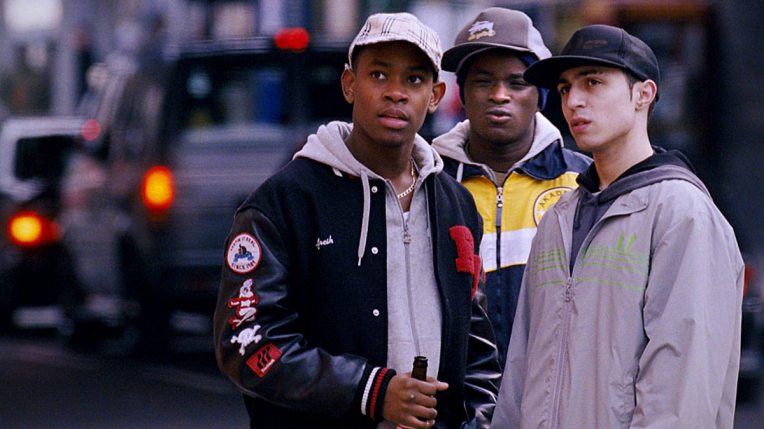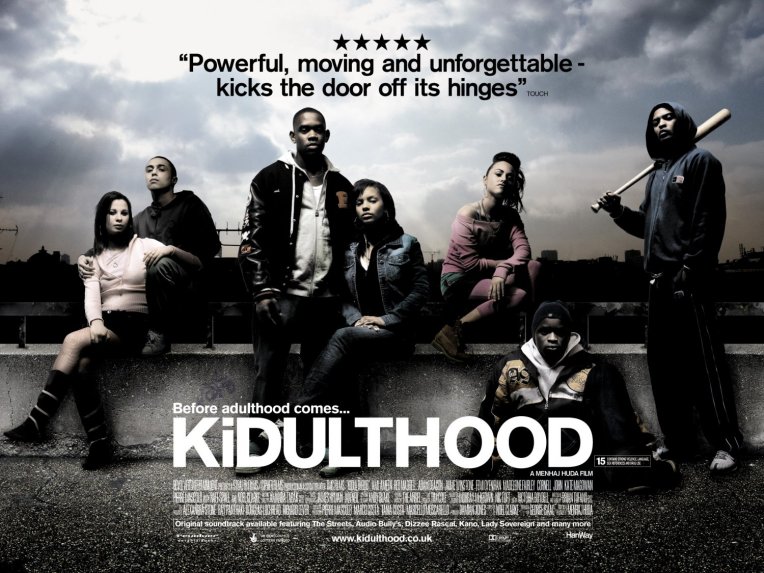 It’s been a while since your average teen did the most reckless things that would get them a 10-day suspension.
It’s been a while since your average teen did the most reckless things that would get them a 10-day suspension.
(Shout out to Chance the Rapper)
All in all, however, when a tale of street life, school kids, and what it means to be grown-up comes at play, Kidulthood has the elements that call out to many Londoners who have felt and experienced the social norms and ghetto based lifestyle that could knock at your front door. In one way, I examined this film similar to John Singleton films such as Boyz N The Hood, Baby Boy, Poetic Justice, Four Brothers as they are popular films of pure observation in the coming-of-age tales I’ve witnessed.
Story
The film opens with the focus on the lives of teens Trevor “Trife” (played by Aml Ameen) and his girlfriend, Alisa (Red Madrell). The two are driven apart due to rumors that have floated around that Alisa slept with Sam (played by Noel Clarke), the film’s antagonist, and we see how the kids before school behave with a level of disrespect, attitude, and a fire in the eyes you would find in adolescence. Trevor denies the allocations that he is the father of Alisa’s baby and this leads him to break away from her and fulfill his fatherly duties.
In the midst, a student named Katie who is consistently bullied hangs herself after Sam’s bullying, both emotionally and physically, that leads her brother to seek revenge on Sam. As the students are given a day off for mourning, all of whom proceed to get ready for a house party later that evening, we see Trevor and his best mates, Jay and Moony (played by Adam Deacon and Femi Oyeniran, respectively) , hanging out with one another, stealing, getting drunk, smoking cannabis, and hitting on women in an very sexual manner.
During the same day, Becky, Alisa’s best friend, decide to get drunk and high despite Alisa’s pregnancy. As Alisa has discovered she is recently pregnant, she becomes unsure of how to cope with the news. Becky takes Alisa out to an older man’s place where they perform sexual favors for he and his friend in exchange for drugs. Becky instigates this as a ploy to get her drugs and Alisa, feeling wrong about the situation, follows through with her friend’s action.
Meanwhile, the boys go to Sam’s house in order to retrieve a Gameboy he stole from one of them earlier in the film. Furthermore, they steal his cannabis and Jay proceeds to have sex with Sam’s girlfriend, Claire. However, Sam returns and threatens them, but soon is struck with a keyboard by Trevor as they beat him up, steal Sam’s stuff, and take Sam’s girlfriend with them. In the process, Sam’s mother is knocked to the floor by the boys as they run away, giving Sam motive for vengeance later.
During a train ride, Alisa and Becky run into some of the girls who bullied Katie earlier in the beginning of the film. Alisa confesses how she felt bad about not being able to help her friend. Soon after, she scolds the girls and gets off the train immediately with Becky after experiencing morning sickness as she throws up. Ultimately, she decides that she will keep the baby.
They arrive later at a shopping centre, after selling the drugs prior, to buy new dresses. Later, the girls meet up with Jay and Moony. Jay, after hearing the information, rudely tells Alisa Trevor isn’t interested in her or the baby and she should move on; which ironically plays on Trife’s ignorance to his fatherly duties. Alisa decides to go home alone as Becky chooses to stay with the boys. In the meantime, Trevor meets up with his Uncle Curtis (played by Cornell John). He sees Katie’s brother, Lenny (played by Rafe Spall), but they say nothing to either person. Trevor tells Curtis he wants to work with them, and is given a revolver, the same used in the film’s introduction he made himself by drilling. Being led downstairs, Trevor sees a man tied to a table, Andreas, who was tortured for failing to live up to payment agreements. Andreas was seen earlier purchasing drugs from Curtis in the film’s introduction. Trevor is ordered to cut the man with a knife he’s given. Trevor, out of fear, does so, but then, runs away. After a traumatizing experience, he throws away the gun and proceeds to find Alisa. Alisa, proceeding on her way home, is stopped by a classmate who invites her to the house party to cheer her up, and after some convincing, agrees to go.
Trevor arrives at the party, finds Alisa, and confesses her love to her. She tells him that she never slept with Sam and that the baby is his. He proceeds to cry out of happiness and jokes about his mother finding out. Sam arrives soon and beats Trevor up with a bat. Alisa runs to the house to get Jay and Moony, who showed up at the party with Becky, and they rush to help Trevor. Alisa screams for Sam to stop and as Sam begins to leave, he picks up the bat and critically injures Trevor after being struck. Soon, Lenny arrives with a gun and threatens to shoot Sam for his sister, but with Trevor’s last breath he states “he isn’t worth it”. Lenny begins to walk away, but after Sam insults him, he fires the gun, which backfires in his hand, and drives away. As the ambulance and police arrive on the scene, Trevor dies in Alisa’s arms.
Theme
The film’s central aspects came down to the social class of its citizens, the coming-of-age syndrome, and psychological and emotional state of the average punk.
The social class shows how they are from the middle to lower class kids in the city. With a run around seen from the eyes of both male and female, Trevor and Alisa experience daily life of cruel obscurity. This clip here is an example of Trevor’s social definition and how cops see not only him, but a view of society for all black London boys.
I am convinced that most people do not grow up…We marry and dare to have children and call that growing up. I think what we do is mostly grow old. We carry accumulation of years in our bodies, and on our faces, but generally our real selves, the children inside, are innocent and shy as magnolias.
and this song sets up the general premise as well as being a promising and message-based song.
Closer
My overall rating for this film is a 4.8 out of 5 stars. The film had strong resolution and resolve that plays and tugs on the emotions of the viewer since it relates back to their teen years. One would call this an “honest-to-God mix between Boyz n the Hood and Do the Right Thing with a splash of British finesse. Noel Clarke’s script is one to be favored, by yours truly, because of his touch of dynamics and reaching out for people to understand the world he or some other person have come from.
Here is the trailer for Kidulthood:

Thanks for reading. Stay tuned for more!
P.S.- I’ll have Adulthood (the sequel) posted up by next week.
